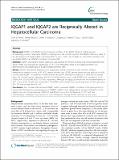| dc.contributor.author | White, Colin David | |
| dc.contributor.author | Khurana, Hema | |
| dc.contributor.author | Gnatenko, Dmitri V | |
| dc.contributor.author | Li, Zhigang | |
| dc.contributor.author | Odze, Robert D. | |
| dc.contributor.author | Sacks, David Barry | |
| dc.contributor.author | Schmidt, Valentina A | |
| dc.date.accessioned | 2011-04-28T23:16:19Z | |
| dc.date.issued | 2010 | |
| dc.identifier.citation | White, Colin D., Hema Khurana, Dmitri V. Gnatenko, Zhigang Li, Robert D. Odze, David B. Sacks, and Valentina A. Schmidt. 2010. IQGAP1 and IQGAP2 are reciprocally altered in hepatocellular carcinoma. BMC Gastroenterology 10: 125. | en_US |
| dc.identifier.issn | 1471-230X | en_US |
| dc.identifier.uri | http://nrs.harvard.edu/urn-3:HUL.InstRepos:4879179 | |
| dc.description.abstract | Background: IQGAP1 and IQGAP2 are homologous members of the IQGAP family of scaffold proteins. Accumulating evidence implicates IQGAPs in tumorigenesis. We recently reported that IQGAP2 deficiency leads to the development of hepatocellular carcinoma (HCC) in mice. In the current study we extend these findings, and investigate IQGAP1 and IQGAP2 expression in human HCC. Methods: IQGAP1 and IQGAP2 protein expression was assessed by Western blotting and immunohistochemistry. IQGAP mRNA was measured by quantitative RT-PCR. The methylation status of the Iqgap2 promoter was determined by pyrosequencing of bisulfite-treated genomic DNA. Results: IQGAP1 and IQGAP2 expression was reciprocally altered in 6/6 liver cancer cell lines. Similarly, immunohistochemical staining of 82 HCC samples showed that IQGAP2 protein expression was reduced in 64/82 (78.0%), while IQGAP1 was present in 69/82 (84.1%). No IQGAP1 staining was detected in 23/28 (82.1%) normal livers, 4/4 (100.0%) hepatic adenomas and 23/23 (100.0%) cirrhosis cases, while IQGAP2 was increased in 22/28 (78.6%), 4/4 (100.0%) and 23/23 (100.0%), respectively. Although the Iqgap2 promoter was not hypermethylated in HCC at any of the 25 CpG sites studied (N = 17), IQGAP2 mRNA levels were significantly lower in HCC specimens (N = 23) than normal livers (N = 6). Conclusions: We conclude that increased IQGAP1 and/or decreased IQGAP2 contribute to the pathogenesis of human HCC. Furthermore, downregulation of IQGAP2 in HCC occurs independently of hypermethylation of the Iqgap2 promoter. Immunostaining of IQGAP1 and IQGAP2 may aid in the diagnosis of HCC, and their pharmacologic modulation may represent a novel therapeutic strategy for the treatment of liver cancer. | en_US |
| dc.language.iso | en_US | en_US |
| dc.publisher | BioMed Central | en_US |
| dc.relation.isversionof | doi:10.1186/1471-230X-10-125 | en_US |
| dc.relation.hasversion | http://www.ncbi.nlm.nih.gov/pmc/articles/PMC2988069/pdf/ | en_US |
| dash.license | LAA | |
| dc.title | IQGAP1 and IQGAP2 are Reciprocally Altered in Hepatocellular Carcinoma | en_US |
| dc.type | Journal Article | en_US |
| dc.description.version | Version of Record | en_US |
| dc.relation.journal | BMC Gastroenterology | en_US |
| dash.depositing.author | Sacks, David Barry | |
| dc.date.available | 2011-04-28T23:16:19Z | |
| dash.affiliation.other | HMS^Pathology | en_US |
| dash.affiliation.other | HMS^Pathology | en_US |
| dc.identifier.doi | 10.1186/1471-230X-10-125 | * |
| dash.contributor.affiliated | White, Colin | |
| dash.contributor.affiliated | Sacks, David Barry | |
| dash.contributor.affiliated | Odze, Robert | |


